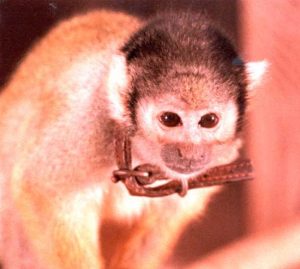Sometime in the late 1930’s or early 1940’s, a monkey named Betty escaped from the Lincoln Park Zoo. The Lincoln Park Zoo was a small zoo that was located in Grand Junction’s Lincoln Park in the early and mid-Twentieth century. According to William “Bill” Ela, who grew up to become a Mesa County District Court judge, the animal had escaped two times before. The zookeeper had been able to catch her and return her to her enclosure both times. After her third escape, Betty eluded capture.
Ela recounts that Betty took up residence on the other side of 12th Street from Lincoln Park. She resided in the trees and on the roof of prominent water lawyer Silmon Smith, who lived in the 1000 block of Chipeta Avenue (Smith was one of the foremost water-law attorneys in the nation. His role in Colorado River compact negotiations helped create the state and national laws that still govern water use today. He also advocated for the Western Slope in negotiations). If someone tried to capture Betty from the trees, she went to the roof. If someone tried to capture her from the roof, she went to the trees. The zookeeper finally gave up.
Betty’s escape was publicized in the newspaper. Three friends who lived in the Lincoln Park area, Al Look Jr., Bill Ela, and Robert “Bob” Johnson, decided to try and capture Betty. They set a trap baited with bananas at the foot of the tree. At first, Betty eluded capture by holding open the door to the trap while grabbing the bananas. Then, they built an elongated trap that forced Betty farther into it in order to get to the bananas. They captured her and brought her to the greenhouse of Robert Johnson’s father, Stephen “Steve” Johnson, who owned Johnson’s House of Flowers on nearby North Avenue.
They informed the zoo that they had the monkey, but the zoo refused to take her back (this according to Ela). Bob built an enclosure for Betty in the greenhouse that was ten feet square and 6 feet high. There she lived for many years.
According to Steve Johnson, the boys later captured another monkey, who had perhaps been owned by a Greek American named Gianna Karis. Karis owned a game farm on 1st Street and Patterson Road. The elder Johnson believed that Oscar, the monkey, may have escaped from there. In Ela’s recollection, Oscar was a monkey borrowed from the zoo in order to breed with Betty. The monkeys did in fact breed and Bob Johnson raised the infant. Betty and Oscar eventually died of old age, but Johnson had Betty’s baby for many years, until Look, Ela, and Bob Johnson all went to college just before World War II. It is unknown what happened to Betty’s offspring after that.
To learn more about Betty the monkey and the pioneering Ela family, listen to the oral history interview of William McHarg “Bill” Ela. To hear more about Betty’s life after capture, listen to an interview with Stephen “Steve” Johnson, whose Johnson’s House of Flowers was one of the more prominent businesses on North Avenue for many years. Explore the Mesa County Oral History Project (a joint project of the Museums of Western Colorado and Mesa County Libraries) in the library’s 970West Digital Collection.


this is adorable
Hi Deirdre,
Thank you very much for the comment. We are glad that you enjoyed the blog post.
Noel